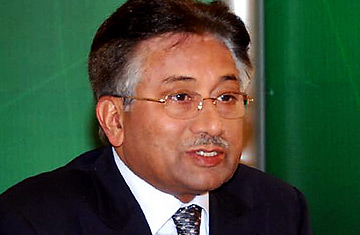
Pakistani President Pervez Musharraf on January 3, 2008
A team of Scotland Yard investigators has arrived in Pakistan to assist authorities in the investigation into the assassination of former Prime Minister Benazir Bhutto, who was killed on December 27 in a terrorist attack. Pakistani President Pervez Musharraf had initially rejected offers of international assistance with the inquiry, but changed tack mid-week, saying he was "displeased with the investigation," and that "we need more experience, maybe more forensic and technical experience that our people don't have." But given that the crime scene was hosed down within hours of the attack, and Bhutto was buried a week ago without a autopsy, the much vaunted Scotland Yard will be able to lend little more than a veneer of impartial credibility to the investigation into her death, which many Pakistanis attribute to government hands.
Musharraf maintains the al-Qaeda affiliated pro-Taliban militant leader Baitullah Mehsud was behind the attack. But he has also said that Bhutto, who was shot at as she waved to supporters from the sunroof of her armored vehicle, was also partly responsible. She had been warned repeatedly that she was under threat, he told a gathering of journalists on Thursday, but she neglected to take the necessary safeguards and insisted on holding a rally at Liaqat Bagh Park, which intelligence agencies had specifically told her was dangerous. "She went of her own volition, ignoring the threat," he said. And then she decided to stand outside the protection of her SUV. "Who is to blame for her coming out of the vehicle and standing outside? Who is to blame? The law enforcement agencies?" Musharraf asked angrily.
Bhutto's Pakistan People's Party spokeswoman Sherry Rehman scoffs at the insinuation that Bhutto is responsible for her own death, saying, "This is an insult to the shaheed [martyred] leader and all those who lost their lives with her. The regime is essentially trying to say that they all deserved to die because they attended a public rally, which is their constitutional right. Rather than admitting its own failure in safeguarding the life and property of Pakistani citizens, the regime is trying to tell people that you will be responsible for the consequences if you try to exercise your fundamental rights." She blames the government for not doing enough to protect Bhutto.
More than likely, all three factors played a role in Bhutto's death — imperfect protection (if not criminal negligence), a risky campaigning style, and an extremist group waiting for the perfect opportunity to create havoc in a country already teetering on the edge of collapse. But as campaigning goes forward for parliamentary elections now slated for February 18, many similar opportunities for further destabilization will present themselves. A new report released by the Pakistan Institute for Peace Studies, a terrorism watchdog group, shows that casualties from terrorist attacks have increased fivefold in the past two years. According to the report, as many as 1,442 terrorist attacks, incidents of political violence and border clashes took place in 2007, leaving 3,448 people dead and another 5,353 injured.
"Pakistan People's Party chairperson Benazir Bhuttos tragic assassination and continued attacks on and kidnapping of army personnel round the year put a big question mark on the efficiency and effectiveness of the security forces against terrorism and to control the law and order situation in the country," wrote the report's authors.
